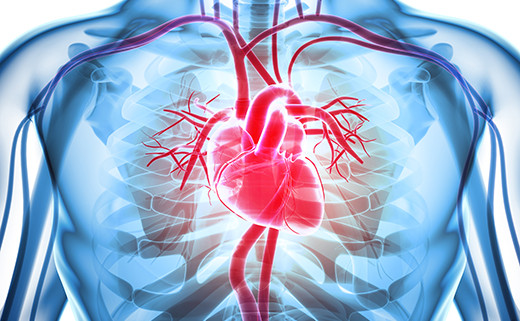Definisi
Penyakit jantung rematik adalah kondisi dimana terjadi kerusakan katup jantung secara permanen akibat demam rematik. Demam rematik sendiri merupakan sebuah penyakit yang diakibatkan oleh proses peradangan yang terutama melibatkan jantung, persendian, kulit, atau otak.
Penyakit jantung rematik terus menimbulkan dampak yang buruk, dengan total kematian global mendekati 300.000 jiwa.
Penyebab
Penyakit jantung rematik disebabkan oleh demam rematik. Demam rematik timbul akibat adanya infeksi tenggorokan oleh bakteri Streptococcus dan demam scarlet yang tidak ditangani dengan tepat. Bakteri Streptococcus grup A atau GAS dapat menyebabkan infeksi tenggorokan dan demam scarlet.
Kerusakan katup jantung dapat dimulai segera setelah infeksi GAS seperti radang tenggorokan atau demam scarlet, yang tidak tertangani dengan baik. Respon imun akan menyebabkan kondisi peradangan pada tubuh yang dapat menimbulkan kerusakan jantung yang terus berlanjut. Katup jantung dapat mengalami peradangan dan meninggalkan jaringan parut (scarring). Hal ini dapat menyebabkan penyempitan atau bocornya katup jantung sehingga akan mengganggu fungsi normal jantung. Proses ini dapat terjadi selama bertahun-tahun dan dapat menyebabkan gagal jantung.
Penyakit jantung rematik tidak menular. Seseorang tidak dapat terkena penyakti jantung rematik dari orang lain karena penyakit ini merupakan respon imun dan bukan infeksi. Namun, orang dengan infeksi tenggorokan akibat bakterin GAS atau demam scarlet dapat menyebarkan bakteri GAS ke orang lain, terutama melalui droplet pernapasan.
Faktor Risiko
Semua orang dapat terkena penyakit jantung rematik, namun penyakit ini lebih sering ditemukan pada anak-anak usia sekolah (usia 5 sampai 15 tahun). Penyakit jantung rematik sangat jarang ditemukan pada anak-anak berusia kurang dari tiga tahun dan pada orang dewasa. Risiko tertinggi adalah pada anak yang mengalami infeksi tenggorokan akibat GAS berulang, terutama yang tidak ditangani dengan baik.
Penyakit infeksi, termasuk infeksi Streptococcus grup A (GAS), cenderung mudah menyebar saat terdapat sekelompok besar orang yang berkumpul bersama. Oleh karena itu, orang yang berada pada lingkungan padat penduduk lebih berisiko untuk terkena infeksi tenggorokan GAS atau demam scarlet, sehingga lebih rentan mengalami penyakit jantung rematik. Lingkungan padat penduduk tersebut meliputi:
- Sekolah
- Tempat penitipan anak
- Tempat pelatihan militer
Selain itu, penyakit ini lebih sering terjadi pada negara berkembang dibandingkan dengan negara maju karena sistem kesehatan yang masih kurang. Orang dengan tingkat sosioekonomi rendah juga berisiko tinggi karena kurangnya akses terhadap pelayanan kesehatan.
Gejala
Gejala demam rematik bervariasi dan biasanya baru muncul 1 sampai 6 minggu setelah infeksi tenggorokan. Pada beberapa kasus, infeksi dapat sangat ringan sehingga tidak disadari. Gejala demam rematik yang paling sering ditemui adalah:
- Demam
- Nyeri sendi disertai bengkak dan kemerahan, terutama pada sendi lutut dan pergelangan kaki
- Benjolan di bawah kulit
- Ruam berbentuk seperti cincin, menimbul, dan berwarna merah muda. Biasanya ruam terdapat pada dada, punggung, dan perut
- Sesak napas dan rasa tidak nyaman pada dada
- Gerakan tangan, kaki, atau otot wajah yang tidak terkontrol, disebut chorea
- Kelemahan
Gejala penyakit jantung rematik tergantung pada tingkat kerusakan katup jantung. Gejala dapat meliputi:
- Sesak napas, terutama saat beraktivitas atau saat berbaring
- Nyeri dada
- Bengkak, biasanya pada kaki atau bagian terbawah (mengikuti gravitasi)
Diagnosis
Riwayat infeksi tenggorokan oleh GAS atau riwayat demam rematik merupakan kunci untuk diagnosis penyakit jantung rematik. Pada pemeriksaan fisik, penyakit jantung rematik akan ditemukan adanya bunyi jantung yang tidak normal. Bunyi tidak normal ini disebabkan oleh darah yang bocor di sekitar katup yang rusak. Bunyi yang tidak normal ini dapat disertai dengan bunyi gesekan yang merupakan bunyi gerakan atau jantung yang meradang.
Biasanya diperlukan pemeriksaan tambahan untuk mendiagnosis penyakit jantung rematik, antara lain:
- Pemeriksaan swab tenggorokan. Sampel yang didapatkan akan dikirim ke laboratorium untuk dilihat apakah benar infeksi tenggorokan disebabkan oleh bakteri Streptococcus grup A
- Pemeriksaan darah. Beberapa pemeriksaan darah dapat digunakan untuk mencari adanya infeksi dan peradangan
- Ekokardiogram (echo). Pemeriksaan ini menggunakan gelombang suara untuk memeriksa ruang dan katup jantung. Gelombang suara echo yang dihantarkan oleh alat yang ditempelkan di kulit di atas jantung akan menghasilkan gambar pada layar. Pemeriksaan ini dapat menunjukan kerusakan pada katup, aliran balik darah melalui katup yang bocor, adanya cairan di sekitar jantung, dan pembesaran jantung. Pemeriksaan ini merupakan pemeriksaan yang paling berguna untuk mendiagnosis adanya kelainan katup jantung
- Elektrokardiogram (EKG), tes ini merekam kekuatan dan waktu aktivitas listrik jantung. EKG akan menunjukan ritme tidak normal dan terkadang dapat juga mendeteksi kerusakan otot jantung. Sensor-sensor kecil akan dilekatkan pada kulit Anda untuk menangkap aktivitas listrik jantung.
- Rontgen dada. Pemeriksaan ini dapat dilakukan untuk memeriksa paru dan melihat adanya pembesaran jantung
- MRI jantung. Pemeriksaan ini menghasilkan gambar jantung yang detail, yang dapat dipakai untuk melihat katup jantung dan otot jantung secara lebih detail dan jelas
Tata Laksana
Tata laksana untuk penyakit jantung rematik bergantung pada tingkat kerusakan pada katup jantung. Pada kasus yang berat, mungkin dibutuhkan pembedahan untuk memperbaiki katup yang rusak atau menggantinya dengan katup buatan. Operasi yang dilakukan pada waktu yang tepat dapat mengurangi risiko berkembangnya gagal jantung, disabilitas, dan kematian.
Terapi paling baik adalah dengan mencegah demam rematik. Antibiotik golongan Penicillin biasanya dapat menangani infeksi Streptococcus dan mencegah terjadinya demam rematik. Antibiotik ini dapat diberikan secara suntikan maupun minum. Sementara itu, obat-obatan anti-radang seperti aspirin, steroid, atau OAINS dapat digunakan untuk mengurangi peradangan dan menurunkan risiko kerusakan jantung. Jika telah terjadi gagal jantung, maka dibutuhkan obat-obatan lain untuk menangani gagal jantung.
Orang yang pernah menderita demam rematik biasanya diberikan antibiotik setiap hari atau setiap bulan, tergantung tipe antibiotik yang dipilih. Terapi antibiotik ini mungkin dapat diberikan seumur hidup untuk mencegah infeksi berulang dan menurunkan risiko kerusakan jantung lebih lanjut.
Komplikasi
Beberapa komplikasi penyakit jantung rematik adalah:
- Gagal jantung. Hal ini dapat terjadi akibat penyempitan atau kebocoran katup yang berat
- Endokarditis bakterial. Ini adalah infeksi lapisan dalam jantung dan dapat terjadi jika terdapat kerusakan katup jantung
- Komplikasi kehamilan dan persalinan akibat kerusakan jantung. Oleh karena itu, wanita dengan penyakit jantung rematik harus berkonsultasi dengan dokter jika ingin merencanakan kehamilan
- Pecahnya katup jantung. Kondisi ini merupakan kondisi kegawatdaruratan medis dan harus segera ditangani dengan operasi penggantian atau perbaikan katup jantung
Pencegahan
Diagnosis dini infeksi Streptococcus (GAS) dan demam scarlet serta terapi antibiotik merupakan kunci dalam pencegahan penyakit jantung rematik. Penting untuk meminum antibiotik sesuai dengan petunjuk dokter dan jangan berhenti minum hanya karena merasa sudah membaik.
Kapan Harus ke Dokter ?
Jika Anda memiliki gejala penyakit jantung rematik, segera berkonsultasi dengan dokter.
- dr Nadia Opmalina
Rheumatic Heart Disease. Hopkinsmedicine.org. (2022). Retrieved 29 March 2022, from https://www.hopkinsmedicine.org/health/conditions-and-diseases/rheumatic-heart-disease.
Contemporary Diagnosis and Management of Rheumatic Heart Disease: Implications for Closing the Gap: A Scientific Statement From the American Heart Association. Circulation. (2022). Retrieved 29 March 2022, from https://www.ahajournals.org/doi/10.1161/CIR.0000000000000921.
Rheumatic Heart Disease. Who.int. (2022). Retrieved 29 March 2022, from https://www.who.int/news-room/fact-sheets/detail/rheumatic-heart-disease.
Dass, C., & Kanmanthareddy, A. (2022). Rheumatic Heart Disease. Ncbi.nlm.nih.gov. Retrieved 29 March 2022, from https://www.ncbi.nlm.nih.gov/books/NBK538286/.
Sika-Paotonu, D., Beaton, A., Raghu, A., Steer, A., & Carapetis, J. (2022). Acute Rheumatic Fever and Rheumatic Heart Disease. Ncbi.nlm.nih.gov. Retrieved 29 March 2022, from https://www.ncbi.nlm.nih.gov/books/NBK425394/.












